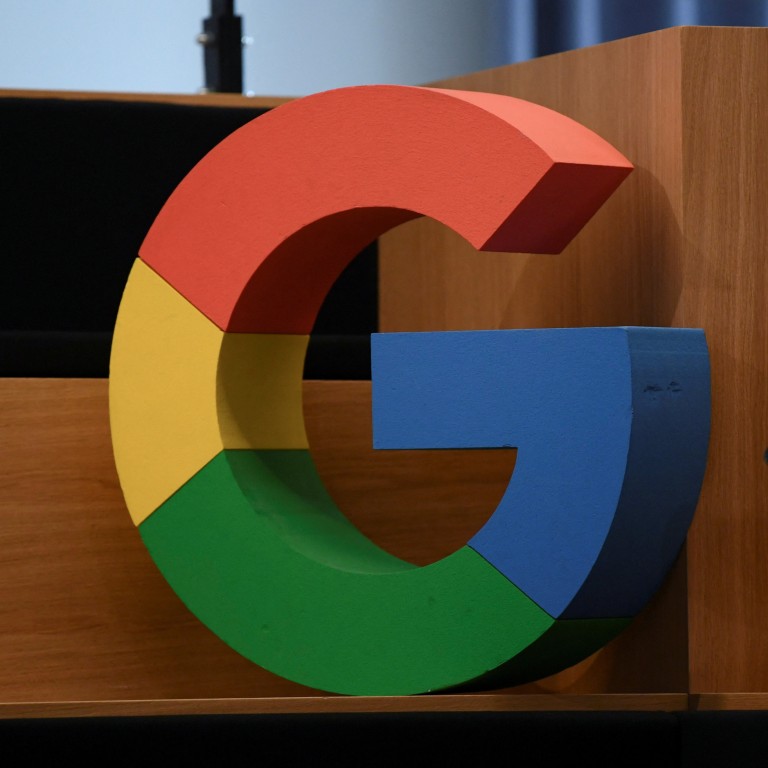
Google defends decision to refuse Hong Kong request to make Chinese national anthem top search result for certain keyword queries
- Tech giant makes it clear it will not manually manipulate organic web listings to determine ranking of a specific page
- Beijing weighs in on matter by vowing to back Hong Kong government and reminding Google of its ‘obligation’ to disseminate correct information
Google has defended its decision to refuse a request by Hong Kong’s government to ensure the Chinese national anthem appears as a top search result for certain keywords, making it clear that it will not manually manipulate organic web listings.
But the company pledged to continue to engage with the government and explain how its platforms and removal policies worked.
The tech giant broke its silence three days after Secretary for Security Chris Tang Ping-keung accused the company of “double standards” and questioned its explanation that it could not change the algorithm-determined results.

Beijing also weighed in on the matter on Wednesday by reminding Google of its “obligation” to disseminate correct information to the public.
In a reply to the Post, the company maintained it was not its practice to manually manipulate web listings.
“Google handles billions of search queries every day, so we build ranking systems to automatically surface relevant, high quality, and helpful information. We do not manually manipulate organic web listings to determine the ranking of a specific page,” its spokesman said.
“In keeping with our commitment to maximise access to information, we do not remove web results except for specific reasons outlined in our global policy documentation.”
Google’s policies state it will block or remove search results related to child sexual abuse imagery or material, highly personal information and spam, as well as content demanded by website owners and valid legal requests.
China’s foreign ministry weighs in on Hong Kong protest song issue, Google clash
According to Google, its content policies balance “the real concerns that people may have about certain types of content” and “the need for a search engine to provide access to information”.
The row between the government and Google was triggered by a series of anthem-related mix-ups during overseas sport tournaments.
At a rugby match in South Korea’s Incheon last month, a song linked to the 2019 anti-government protests, “Glory to Hong Kong”, was played instead of the Chinese national anthem “March of the Volunteers”.
Asia Rugby, the organisers of the tournament, earlier admitted the wrong song had been downloaded from the internet and apologised for the mix-up.
Google challenged by Hong Kong leader to ensure correct national anthem tops searches
The national anthem was also labelled incorrectly in a broadcast graphic at two rugby matches.
The local government previously said Google had a role in the error, noting a song labelled as Hong Kong’s national anthem was available for download in the company’s search results, even though it was “factually wrong”.
Tang on Monday said Google’s claim its hands were tied was “incomprehensible” and “unacceptable” given that one could spend money on adverts to get one’s posts promoted.
Tang also accused the tech company of “double standards”, saying it had pledged to follow a recent ruling by the Court of Justice of the European Union that required the removal of search results about the bloc’s residents if they could prove the information was wrong.
Hong Kong security chief slams Google for refusing to fix anthem search results
Chinese foreign ministry spokesman Wang Wenbin on Wednesday also hit out at the tech giant, saying Beijing would back the Hong Kong government’s “resolute defence of the national anthem’s dignity”.
Stuart Hargreaves, associate legal professor at Chinese University, who specialises in information and privacy law, said the ruling Tang cited was not comparable with the government’s request, given the former involved a court order applying a specific European law that protects personal privacy rights in various ways including removal of information online.
“Under European data protection law, search engines must de-reference personal information that is deemed to be false. The government of Hong Kong has chosen not to update the Personal Data (Privacy) Ordinance to do the same, but in any event there is no personal information at issue here,” he said.
Trying to force a change in search results … would raise questions about the government’s commitment to the free flow of information
Given there was no relevant law in Hong Kong that required Google to manually change its search results in the way requested, Hargreaves said the government could consider changing the law to try and force the tech giant’s hand.
“But trying to force a change in search results in that context would raise questions about the government’s commitment to the free flow of information, the lifeblood of Hong Kong as a financial centre,” he warned. “Moreover, such a law could only control the presentation of results in Hong Kong anyway – it would not solve the problem in South Korea.”
It would be more effective for the government to adopt search engine optimisation strategies that closely linked “March of the Volunteers” with “Hong Kong’s national anthem” which would naturally lead to the correct result being displayed over time, he said.

